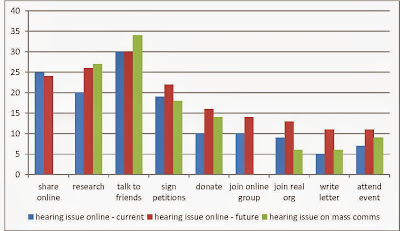Can social media build a community?
Many of you think so. And the
scholars agree. Media expert Henry
Jenkins has observed that 'New forms of community
are emerging, defined through voluntary,
temporary and tactical affiliations, and reaffirmed through common
intellectual enterprises and emotional investments'.
What hold these communities
together? Jenkins believes it's
the 'mutual production and reciprocal
exchange of knowledge' enabled by social
media.
Productive exchanges
have happened on this blog. Dialogue, poetic conversations, and an exchange of personal
views.
In this post,
we look a bit further. Social media has a democratic availability to anyone who
wants to participate in an activist community, one that will right some wrong
in the world. Do we make use of this? My blog visitors certainly do.
Here are the results
of the poll I ran recently among colleagues, fellow students and friends. The
40 respondents, aged 21+, showed a high level of engagement with media, particularly
in terms of sharing with friends any issues of injustice they encountered.
I presented three scenarios:
SCENARIO 1 - what
you’ve already done.
If a friend of yours posted
an article on their Facebook timeline about an issue that really grabbed
you—e.g. child abuse, animal cruelty, injustice, disease, drug abuse,
poverty—have you
1 shared it on your own
timeline? 2 researched the issue?
3 talked to your friends
about it? 4 signed a petition? 5 made a donation?
6 joined an online group? 7
written a letter to the press or a politician? 8 attended an event? 9 joined a
real organisation to help this cause?
SCENARIO 2 - what you might
do in the future
If a friend of yours posted
an article about an issue that really grabbed you—e.g. child abuse, animal
cruelty, injustice, disease, drug abuse, poverty—have you
1 shared it on your own
timeline? 2 researched the issue?
3 talked to your friends
about it? 4 signed a petition? 5 made a donation?
6 joined an online group? 7
written a letter to the press or a politician? 8 attended an event? 9 joined a
real organisation to help this cause?
SCENARIO 3 - Other media If you heard about the same
kind of issue on TV, on the radio or in a newspaper, would you be likely to-
1 research it? 2 talk to friends about it? 3 sign a
petition? 4 make a donation? 5 write a letter to press or
politicians? 6 attend an event? 7 join an organisation to
help?
Here are the results.
Though the sample is very small, the results are consistent. Most respondents
have shared links to issues, researched them, and discussed them with friends.
Around 25% have joined organisations to help address the issues.

Launching dialogue See this site,
in the footsteps of An Inconvenient Truth,
for tips on how to create or strengthen an activist community
We just need to take the
first step, and connect online. That way we can enjoy ‘sense of connection that listening participants can
feel in online spaces’ say Kate
Crawford, of the University of Sydney.
What’s your view? Can
social media create community, do some community building, or even just plant the
first seeds of interest about communal issues?

